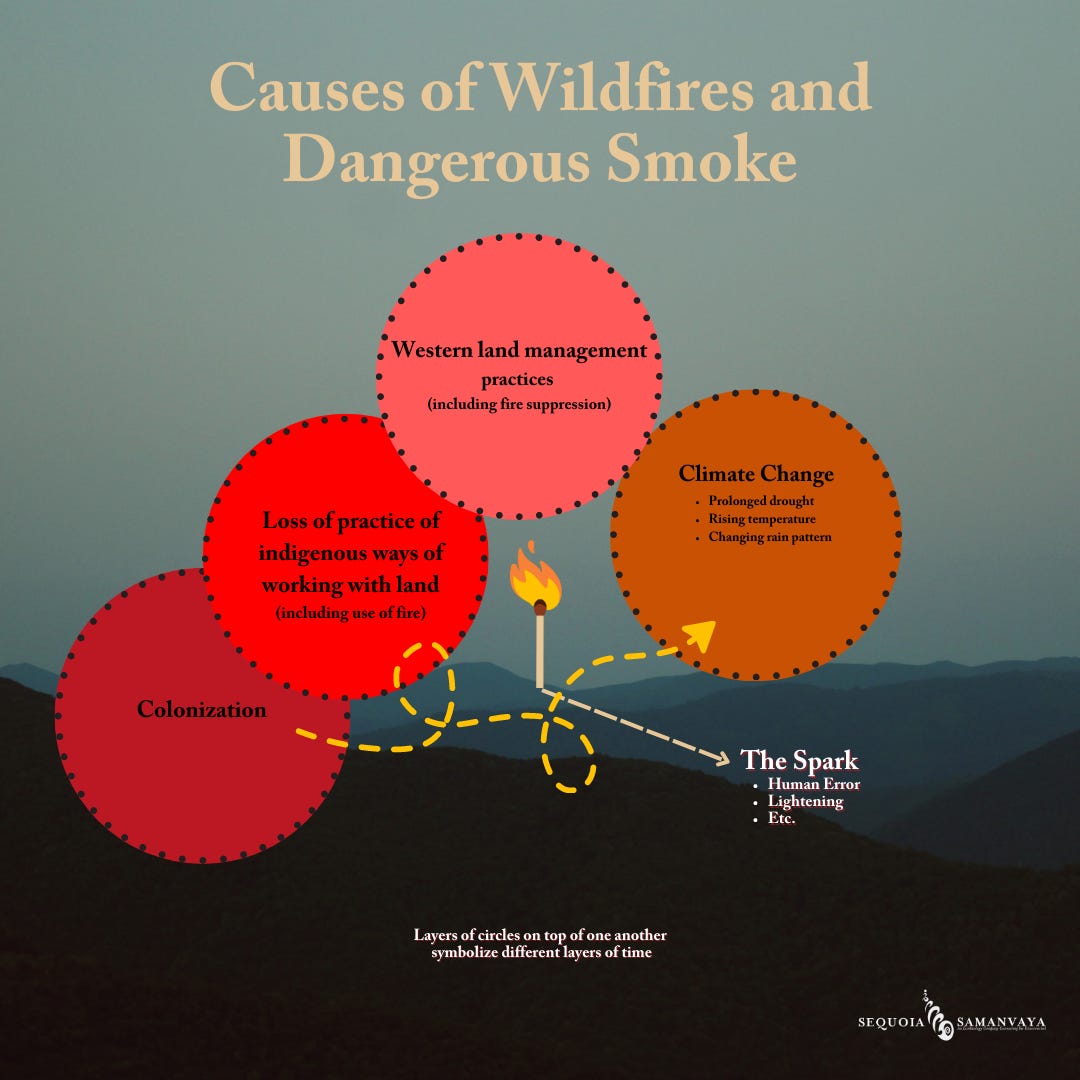No. 54: "Happy" Healing
Smoke / Local Food Systems / South Korean Food Scraps / Affirmative Action / Carbon Colonialism / + more.
Good morning Regenerative School Community,
When considering the Fourth of July in relation to social justice, different perspectives may arise.
Some may view the holiday as an opportunity to reflect on the principles of freedom, equality, and justice that the United States claims to be founded on. Some may use the Fourth to advocate for the full realization of these ideals and to highlight the ongoing struggles for social justice within the country.
The Fourth of July could serve as a platform to raise awareness about historical injustices, ongoing systemic inequalities, and the need for change and progress rather than a platter to serve hot dogs and hamburgers.
Critics argue that the celebration of independence often overlooks the experiences of marginalized communities, including African Americans, Indigenous peoples, and other historically oppressed groups. They astutely point out that the ideals of liberty and justice for all have not been fully realized for everyone in the United States, and that systemic inequities continue to persist… in many cases devolve (*cough* last summer’s Dobb’s decision *cough* this summer’s advancing anti-LGBTQ+ legislation *cough*).
For many of us committed to social justice, the Fourth is an opportunity to engage in critical conversations, education, and activism. It is a chance to shout for a more inclusive, just, and equitable society and open our arms to those around us. It involves reflecting on the nation's violent history, acknowledging its flaws and contradictions, and working towards a future where the promises of freedom and justice are fulfilled for all individuals, regardless of their background or identity.
Today, we arrive in your inbox with some non-firework related news and thoughtful world reads. These recommendations will hopefully help us ease into a reflective and regenerative mindset on this Tuesday, regardless of your plans.
Here’s to deep, easy breaths.
Stay tuned for more Rē School offerings and updates on Friday, July 14th.
Deep gratitude for you wherever and however you are.
Best,
The Rē Team
Most emissions come from food production, not transportation. The Guardian’s Whitney Bauck and Cecilia Nowell explore the truth about “local” food in US supermarkets and ask “Is eating local produce actually better for the planet?”
In “How Arizona Stands Between Tribes and Their Water,” ProPublica and High Country News investigate how Arizona is going to unique lengths to extract concessions during water rights negotiations that limit tribes’ opportunities for growth and economic development. Click here to read more.
When wasted food rots in landfills, it pollutes soil and water — and warms the planet. Here’s how South Korea is putting its food scraps to good use. This New York Times feature is awesome… and so is South Korea’s current solution.
Michelle Gamage’s recent reporting for The Tyee on “How First Nations Are Asserting Sovereignty Over Their Lands and Waters.” Indigenous Marine Protected and Conserved Areas hold a key to food security and balancing ecological and economic priorities.
In These Times’s “Abortion Rights are Trans Rights,” Lexie Bean reflects on how a record amount of anti-LGBT legislation has been unleashed across the country one year after Dobbs. What’s needed now is solidarity among marginalized genders.
The ocean is teeming with microorganisms… and plastic. Scientists have previously discovered how plastic creates habitat and a handy transport system for marine microbes. Now, researchers have shown that chemicals leaching from marine microplastic pollution can make microbes more virulent and resilient. Curious? Read more in this Hakai article.
Last week, the EPA abruptly terminated three of its highest-profile open civil rights complaints. Grist obtained copies of two draft agreements from the now-defunct negotiations, which reveal efforts by EPA officials to institute profound changes to Louisiana’s permitting process, which has historically concentrated chemical plants near Black communities. In “The EPA was on the cusp of cleaning up ‘Cancer Alley.’ Then it backed down,” Lylla Younes tracks what happened and what is to come.
A conservative Supreme Court decided that student-body diversity is not a “compelling interest.” The New Yorker’s Jeannie Suk Gersen explains what this ruling means in “The Supreme Court Overturns Fifty Years of Precedent on Affirmative Action.”
Laurie Parsons’ “Lifting the Curtain on Carbon Colonialism” for Atmos. Carbon colonialism is the system by which the Global North “outsources” carbon emissions by moving dirty industry and waste to the Global South. Parsons urges that the Global North must start taking responsibility for its economy and its production.
Fires worldwide are becoming exponentially larger and more destructive. “Some people like to say this is the new normal. “Some people like to say this is the new normal. I really do not like that term. Normal suggests a steady state. We’re not in a steady state. We’re in a downward spiral in Dante’s circle of hell,” says wildfire expert Dr. Mike Flannigan. Read more in Kelly Kimball’s “The World's Wildfire Models Are Getting Torched” for Heatmap.
We really love this visual from our friends at Sequoia Samanvaya. According to Rev. Sarah Walcott, the answer to what started the Canadian fires begins 400 years ago. Visit their post here for more info.
That’s all for this week! We will see you on July 14th with more Rē School updates and offerings!
What have you been reading? What have you been listening to? Write to us at admin@regenerativeschool.org and let us know.
Thank you and see you soon!
The Rē Team





